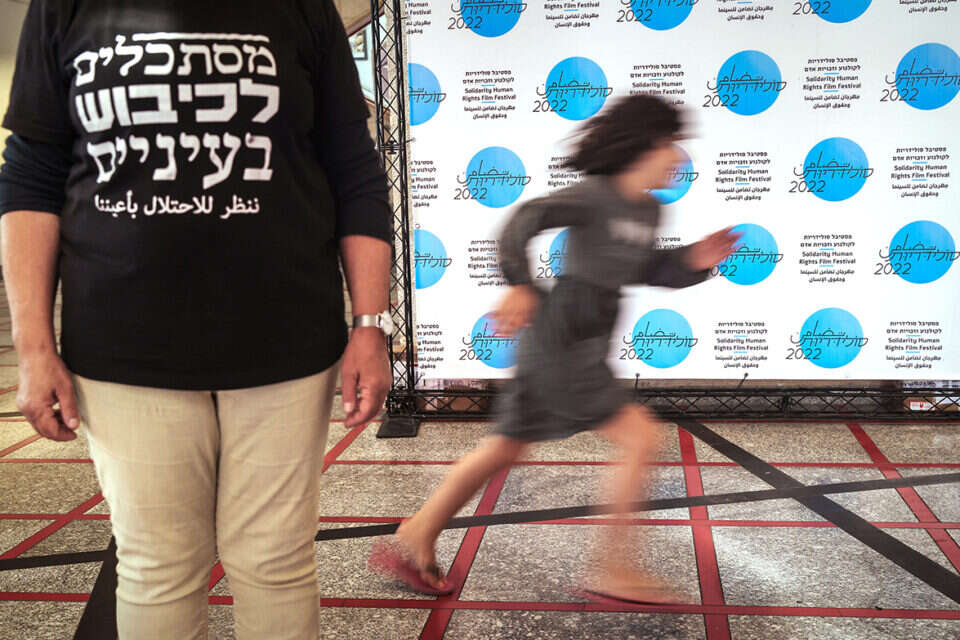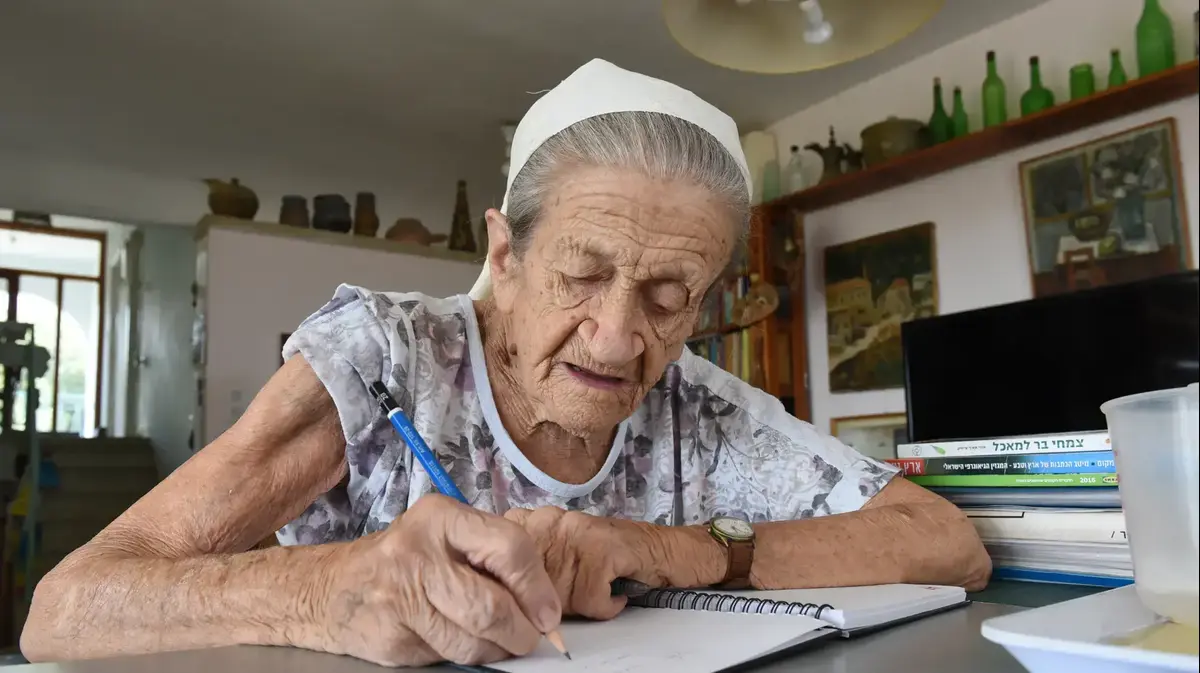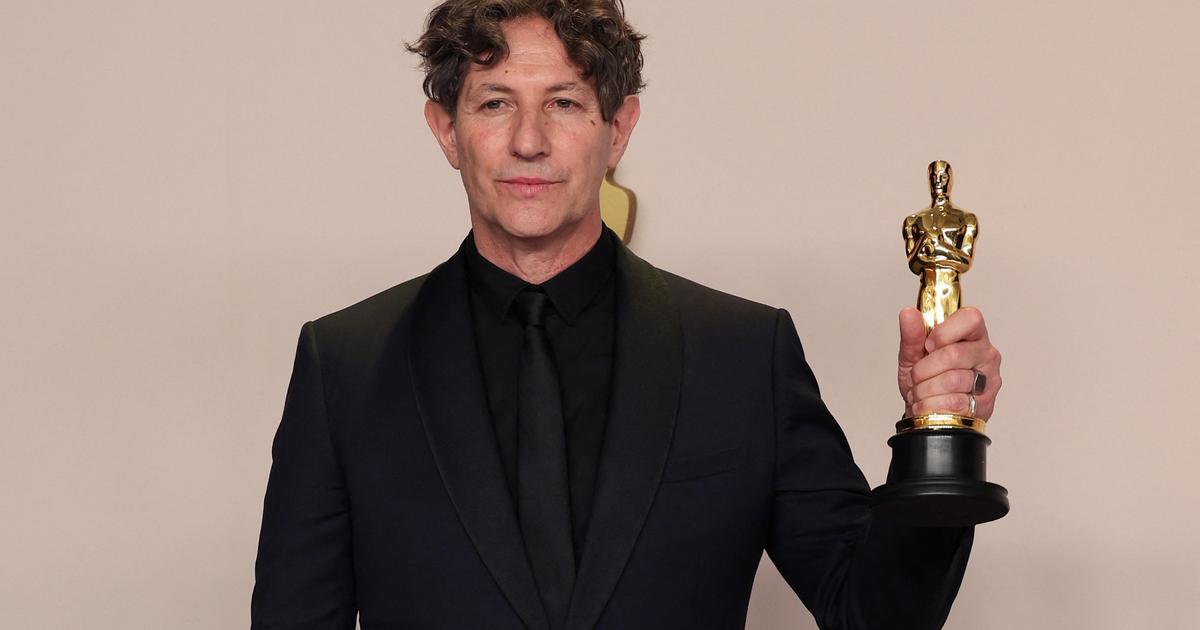Mochash. Saying goodbye to the representative film on his head, putting on pants and adorning himself with glasses. With me, from Ofer on the way to the big city, 17 years old, third generation of the occupation. He also blurs his identity, removes his cap and leaves his curls exposed. Together we enter the Tel Cinematheque Spring to the "Solidarity for Cinema and Human Rights" festival, which lasts for ten days. "Four short films against the occupation: an evening of tribute to Jad Naman", this is the event for which we purchased tickets. At the end of the films, a discussion is expected to take place in collaboration with the Forum of Filmmakers Against the Occupation, as stated in the program The festival. We were afraid that our appearance would stand out; we did not come to infiltrate. We did not come to demonstrate or defy, nor to provoke, just to see what a cultural event that is funded by taxpayers' money looks like.
The first film in the program, "The Night on which the King Was Born", is the film of the late Yehuda Judd Naaman, to whose memory the event is dedicated. Naaman, winner of the Israel Prize, was an Israeli film director and producer, a professor in the film department at Tel Aviv University, a civilian and military doctor who received An exemplary decoration in the Six Day War and held radical left-wing positions. On the IDF's control of Judea and Samaria he wrote: "A tyrannical regime that does not resort to methods of torture, censorship, detention camps and prisons, deportation and acts of murder."
"The Night Where the King Was Born" is a 12-minute feature film from 1983. It describes two corrupt army officers, who invade land owned by a Palestinian and use threats and violence on him to extract his signature on the sale agreement.
The film's intense distaste for settlers in particular and religious people in general is clearly evident.
The land dealer is a Jew wearing a black cap, who meets every anti-Semitic stereotype.
Those who help the officers to abuse the Palestinian are settlers wearing kippa and with long beards, who threaten, beat and shoot indiscriminately.
It is interesting that already in 1983 the political creation in Israel fell into the template trap, which presents the Palestinian as an innocent victim who stands helpless in the face of Israeli evil.
No wonder the film was disqualified at the time by the Film Criticism Council, and only with the intervention of politicians was it screened.
It is disturbing that in the human rights festival the settler and the religious are not included in the scope of a person entitled to human coverage, but are presented in a demonic and one-dimensional manner.
At the end of the screening, the film receives applause from the dozens of people sitting in the hall.
We also swallow saliva and insults and join in the applause.
Hebron: preferred location
The second film, "Memories of Hebron" by director Shimon Dotan, was also made in 1983.
The camera follows three IDF soldiers on a routine patrol in Hebron. Without words, the film succeeds in expressing the Sisyphean nature of the soldiers' mission. It seems that the creator's goal is to present the soldiers as a foreigner, not belonging to the colorful Palestinian environment, while ignoring the Jewish past and present of the city of the ancestors. The film is a shrunken Israeli flag that got tangled in the wire of the military post, to which the soldiers return at the end of the tour. Precisely without drama, the film succeeds in evoking thoughts.
The third film is called "Gilgal Rishon" and was made by Ilan Shaul and Nahum Mokhin in 1977.
He accompanies two reservists patrolling a Palestinian village.
The two sit down at a local restaurant, fill their mouthfuls and run away without paying.
The Palestinian landlord is chasing them.
They grab him and lower him by the paws into the well.
The camera focuses on the wild laughter of the soldiers, enjoying the sadistic abuse.
Suddenly the rope breaks and the man falls to his death.
The two soldiers run away from the scene.
This horrific film presents IDF soldiers as thieves, sadists and murderers. I found no other spirit or complex images in it, apart from the ugly attempt to blacken the IDF soldier.
The fourth film, chronologically later than the others, 2006, is "Road" by Nadav Lapid.
This is a sophisticated but sickening film.
The opening scene is of a young Israeli who uses the story of his father's death to conquer a girl and make out with her near the monument he erected in memory of his father, who was murdered on the spot.
Zelda's words "everyone has a name" are engraved on the monument.
The rest of the film shows the circumstances of the father's death, who worked as a road construction contractor.
The contractor is seen talking on the phone while the Palestinian workers sweat.
Suddenly the workers pounce on him, steal his gun and tie him up.
They put him on trial for the injustices of the occupation.
Adnan, the oldest of the workers, reads him the indictment and describes with a storm of emotions the suffering life of the Palestinians.
The contractor begs for his life and says he only provided them with work.
Adnan accuses him that he has been keeping them busy for a week, and doesn't know their names.
"We all have names. Salem works on the tractor, Kamel digs with a shovel, Moran runs the press."
The sentence is a shot in the head of an innocent citizen.
The film, which deliberately does not give a name to the victim, gives names to the murderers, makes their voices heard and shows an understanding of and support for terrorism.
At the end of the film, the audience applauds enthusiastically.
I am already deeply nauseated by the feeling that I am participating in a festival of solidarity with terrorism.
The "Solidarity" festival was founded in 2011, and this year it celebrates a decade.
This is the first time that it is held with the support of the Ministry of Culture, the Lottery and the Treasury.
This is after in 2021 the Solidarity Association for Activist Art and Human Rights, which operates the festival, submitted a request for government support.
She received NIS 135,968 from the Ministry of Culture, NIS 50,000 from the Tel Aviv Municipality, NIS 37,500 from the lottery and NIS 10,881 from the Ministry of Finance.
In total - more than NIS 230 thousand from public funds.
This is in addition to the funding received by Cinematech Tel Aviv itself, of annual support in the amount of one and a half million shekels from government funds.
And now with one voice
During the discussion, the feeling of dread in me is only growing.
Moderator Noam Shizaf and the participants of the discussion - Prof. Raya Morg, Tawfik Abu Vail, and Alma Ganihar - all hold extreme left or right Palestinian positions.
In the name of the holy war of occupation, it is possible to exclude from the cultural discourse anyone who, God forbid, can spoil the party, centrists or right-wingers, mercifully.
And so the party, where everyone speaks with one voice, is incredibly monotonous.
"The film by Nadav Lapid tells us that what we in the press or in the media receive as an attack, there is behind it a whole mountain of pain, suffering, distress, poverty, despair, desperation," says Prof. Raya Morg, a film and culture researcher from the Hebrew University, whose syllabus for one of her courses Includes "breaking the silence" materials.
Morg expresses support for the message of the film, as if Arabs had never murdered Jews before the occupation.
"I really liked the fact that the film opened with the memorial stone on the mother's way to the father, which has lines from Zelda's song 'Every man has a name' written on it, which we all know and recite at rallies. While I am blaming Adnan turns to the contractor and says to him: 'You never called us by name In the end it resonates very strongly with me, everyone has something."
The audience applauds her enthusiastically.
No one noticed that the Israeli contractor, who was murdered in the film, was not there.
No one criticizes the choice of the two films that stand opposite each other: Palestinians kill for justified reasons, soldiers kill because they don't want to pay a few shekels for a meal.
"Regarding Judd's film about the army's complicity with the settlers in a crime, I won't say anything here if I say that it was shockingly ahead of its time. The group that is there today is not a rotten apple - it's more of a broken vision," Morgue continues.
I look at the 17-year-old, the fruit of the occupation, a particularly beautiful apple, who has never harmed a Palestinian, but nevertheless the enlightened ones on the stage are ready to expel him from his home, even though all his sin amounts to the fact that he was born to parents and grandparents who live in a settlement.
When she is asked about the expected future for cinema that opposes the occupation, she says: "I am not optimistic about anything, but the work that deals with the human spirit cannot be stopped in any place where there is oppression - not in China, not in Turkey, not in Iran, not in dark regimes of all kinds, and also Not in Israel. There is something in the human spirit that emerges even when the road is strewn with bumps of the kinds we encounter today, such as the Loyalty in Culture Law" - Morgue names on the same list Iran, where opponents of a regime are hanged in the city square, and Israel, where the Loyalty Law was not passed, and regime opponents like her are university lecturers public, who are invited to voice their extreme position at the festival, which is supported by government funds.
They take (the money) and cry
Alma Ganihar - screenwriter, playwright, writer and part of the Forum of Filmmakers Against the Occupation - bravely addresses the issue of public funding.
"The funds of the public funds for cinema are funds of the state, which transfers NIS 90 million a year," explains Ganihar, who also serves as a lecturer at those public funds.
"The creators come and say: Give us the state's money and we will do something with it against you - let's see how the soldiers are screwed up and how their commanders are Nazisms. It is absolutely impossible for the state to finance the resistance to the occupation. A screenwriter or director who receives money from the foundation that sits in Tel Aviv can request reimbursement from a foundation Another public one, for example the Shomron Foundation which sits in the heart of the settlements. Understand the paradox. This story is steeped in fascism up to the elbow. The economy of the occupation is so sophisticated that it penetrates our every act and makes us partners involuntarily. In 'B'Tselem' they said: We no longer serve in Zim, because this country is in a state of apartheid and we are no longer able to cooperate.
The filmmakers are not in this place, they take public money."
Later, when the rest of the participants object to her words, Ganihar clarifies that she also takes money from the state.
"We don't have another country to take money from... Obviously, I agree that our job is to demand the money and oppose, but I say there is a problem there. We are helping the country wash its dirty laundry. We need to continue to show the public the truth about the shocking reality in which we live. You don't like the truth, and you don't want to see it, but we will continue to show it to you, against your nose and your anger, until you realize that it is the truth. Only after that happens, we can start discussing things."
"You can see how a situation of despair and hopelessness ends with violence being the solution, as it appears in the very strong statement in Nadav Lapid's film," says Tawfik Abu Wail, an Arab-Israeli director who created, among other things, the controversial series "The Boys."
"People don't want to see these films so they don't know what kind of reality we live in. I'm sorry to say, but the people sitting here are a very, very small minority, which does not represent what is happening in the country. There is a fascist right-wing public atmosphere of intimidation. The word 'occupation' has become A derogatory word. I don't know when it will also be a criminal offense to say the word occupation.
"In my opinion, it doesn't matter where you get the funding, the main thing is that you do your work freely. So what if I go against the state? I pay taxes, damn it. The state takes 50 percent of my income. This is a country that rose on the destruction of another people and still oppresses it . So if you criticize it, are you a traitor and anti-Semitic? You have to stand firm against all the waves and survive. I personally don't want to run away. I don't have the strength to run away. I'm here. So in the end I'll make my films, and I'll speak my mind freely. The thing is that there is now such a feeling of being taken down. You look at the reality and there is a feeling of a witch hunt."
The moderator concludes the evening by saying: "Enough for conquest".
Why not politics now?
After the crowd disperses, I approach Danny Wilensky, the founder of the festival, and introduce myself by name and my occupation.
Wilensky is a pleasant man who talks to me for a long time and claims that I fell for a specific event from the many events of the festival, where 80 films from all over the world dealing with hunger and poverty, women's rights and the gay community, the climate crisis, people with special needs and freedom of the press were shown.
The catalog also tells about other political events in which representatives of "Breaking the Silence", the Association for Civil Rights and "Betselem" participated.
When I ask about the lack of speakers from the center or the right, he accepts the criticism.
He says that "last year, three student films from Ariel University were presented at the festival, but this year none of them responded to the call of the audience. For about six years, the festival, in cooperation with the Mazon organization, has been continuously conducting large-scale social cinema activities among disadvantaged populations in the periphery."
Let it be said right away: these things do not challenge the right of the festival to take place, or call for silence.
On the contrary - it is good that such events take place freely, without fear of silence or supervision.
The only relevant question is whether the public should finance them.
There is no doubt that the boundaries between culture and politics are blurred, and art that is projected as "neutral" is also imbued with the values of its time and its creators;
And there is also mobilized art.
But when even the panel participants are unanimous about the use of cultural content as a tool to promote a distinct political agenda and the political role of the creators - and even go into an absurd discussion about the morality of using "tainted" public money - we have long been out of the realms of cultural-artistic discourse.
At least we know what we do with our money.
The response of the Ministry of Culture: "The 'Solidarity' festival is supported by the Ministry of Culture and Sports based on distinctions in the cinema regulations (distinguishing the film as an Israeli film). The ministry does not have the authority in the Budget Basics Law 3A to deny support from a cultural institution. This authority rests only with the Ministry of Finance. It is appropriate that Supported cultural institutions will not use and abuse the support provided for cultural activity only."
were we wrong
We will fix it!
If you found an error in the article, we would appreciate it if you shared it with us


/cloudfront-eu-central-1.images.arcpublishing.com/prisa/ZUSCQAAVDZB4ZG3O6HXHMJFWCI.jpg)






